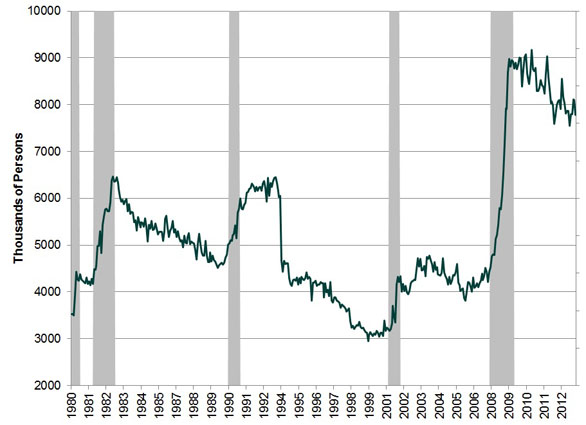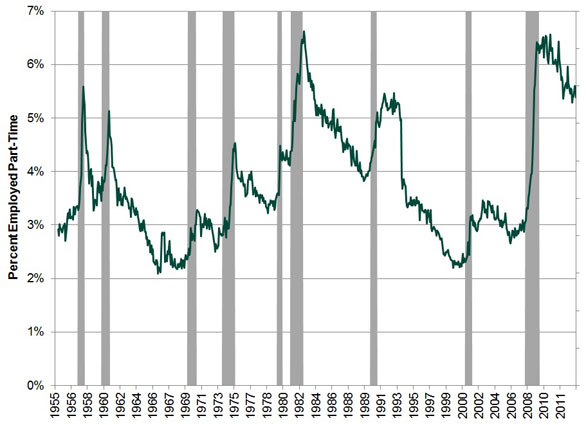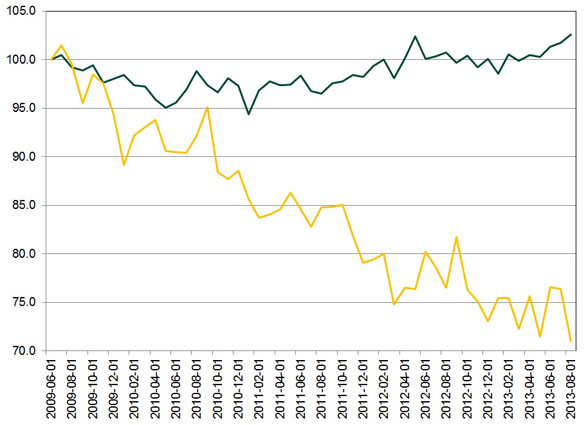Personal Wealth Management / Market Analysis
Part-Time Reasoning on Part-Time Employment
Many in the media fret employment is improving primarily due to an increase in part-time jobs-but do the data bear that out?
Headlines are often scary. As a good friend and colleague often notes, the media is still in the for-profit business-they don't go to work in white cars with red crosses on the side. But reacting to every scary headline can do tremendous damage to investors-particularly those with longer time horizons and goals necessitating returns at least close to the market's long-term average. Lately, it appears a major story is the jobs the US economy is now creating only amount to part-time work-often, terribly undesirable "McJobs." But is this change reflective of a fundamental shift in the economy? And if so, does it matter for stocks?
McJobs-a term coined in mid-1985, ironically about the same point in an economic expansion-are jobs no one would want under stronger economic circumstances but which they're forced to take for now because they're preferable to continued unemployment. And if you look at some of the absolute numbers, those jobs might be on the rise lately: The Wall Street Journalrecently reported the percentage of Americans currently working part time who would prefer full-time employment increased from 8.6% in September 2012 to 9.4% in September 2013.
Queue up your sell orders-right?
Well, probably not. Unless (very broadly speaking) you think something fundamental about underlying US or global economic strength has changed-which these data don't seem to show.
Let's dive a little deeper to see the full, unadulterated picture. First, consider there are myriad reasons someone might be employed only part time. Maybe they're unable to find full-time employment, though that would be their preference, so they settle for a part-time job. (When the media discusses part-time employment, these are frequently the folks they're seemingly alluding to.) But what if there are folks who want to work part time? Maybe because they'd like to spend more time with their kids or grandkids. Or maybe because they're nearing retirement but aren't quite ready to hang it up altogether. Or maybe they're in school. Or or or. The reality is people could choose to work part time for a whole host of reasons, none of which spell certain and imminent economic doom.
Fortunately, the Bureau of Labor Statistics (BLS) distinguishes between part-time employment for economic reasons versus non-economic reasons-the former representing people unable to find full-time employment but would prefer it; the latter representing our folks who'd actually prefer to work part time.
With that in mind, then, let's dig into the data. Based on the level of part-time employment for economic reasons (Exhibit 1), it certainly seems there's been a huge shift to part-time employment-particularly relative to previous recessions (shaded grey).
But this isn't an unprecedented pattern: We've seen part-time employment rise in each of the last five recessions (the pattern holds prior to that as well). Yes, but not to the same level, you might say.
Exhibit 1: Part-Time Employment Level for Economic Reasons in Non-Agricultural Industries, 1980-Present

Source: Federal Reserve Bank of St. Louis, research.stlouisfed.org
Well, consider this, too: A big jump in the level alone doesn't tell you much relative to the total working population. So instead, you can look at part-time employment for economic reasons relative to total employment (Exhibit 2)-and there, we see a similar pattern. Going back to 1955, the percentage of part-time employment has increased in every recession-granted, not always to the same extent, but the level we're seeing today isn't unprecedented.
Exhibit 2: Part-Time Employment for Economic Reasons as a Percentage of Total Employment, 1955-Present

Source: Federal Reserve Bank of St. Louis, research.stlouisfed.org
Let's look at the distinction between part-time employees for economic versus non-economic reasons to see whether we're witnessing an unprecedented shift toward economic reasons. Exhibit 3 shows employment levels for each of the two groups indexed to 100 from the trough of the last recession (June 2009) through the most recent data available (August-which may or may not be entirely timely given the government shutdown, but I digress). As you can see, the number of part-time employees for economic reasons, slack work or business conditions has fallen off dramatically since the current economic expansion began. Meanwhile the number of part-time employees for non-economic reasons has overall increased-the opposite of what you'd expect to see if the economy were strictly creating dreaded McJobs.
Exhibit 3: Part-Time Employment for Economic Versus Non-Economic Reasons, June 2009-Present, Indexed to 100

Source: Federal Reserve Bank of St. Louis, research.stlouisfed.org
So you have to ask yourself: If part-time employment is rising for largely non-economic reasons, can you reasonably conclude there's something fundamentally ailing the US economy? Well, if employees are choosing to work part time, it must be the case both companies and those part-time employees are benefiting. Otherwise, neither party would agree to the arrangement! That's basic economics, folks: By definition, parties who freely enter any transaction must benefit from that transaction-otherwise, they'd take their ball and go home.
Which brings us back to our original question of whether investors should take portfolio action based on recent unemployment headlines. Now, here I'll issue our standard reminder: Unemployment lags and stocks lead. So knowing that, you'd likely be aware the answer should be biased toward, "No." And since the data seemingly show the part-time phenomenon is historically typical and the present magnitude is underpinned at least in part by folks choosing to work part time, the answer is seemingly a resounding "No!"
If you would like to contact the editors responsible for this article, please message MarketMinder directly.
*The content contained in this article represents only the opinions and viewpoints of the Fisher Investments editorial staff.
Get a weekly roundup of our market insights
Sign up for our weekly e-mail newsletter.

You Imagine Your Future. We Help You Get There.
Are you ready to start your journey to a better financial future?

Where Might the Market Go Next?
Confidently tackle the market’s ups and downs with independent research and analysis that tells you where we think stocks are headed—and why.





